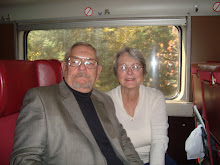Today we went to the Village Historique Acadien for most of the day. On the way we passed this old house with a variety of figures out in front.
Even the flower gardens were red, white, and blue.
We arrived at the village we noticed that it is all set out as working farms. The first area we came to had a cow and her nursing calf.
There was a crew delivering hay.
Everyone was in period costume.
This is the Mazerolle Farm that dates back to 1852.
This oven was just waiting for the homemade bread that was rising in one of the homes.
All of the farms had chicken coops with fenced yards.
One farm had turkeys.
Another had pigs.
This was the broom maker's cottage. He was eating lunch while we were there.
These are his tools of the trade and some brooms in various stages.
All of the farms also had beautiful vegetable gardens.
Here are Laura, Mike and Karla walking up to the Charles Robin Company (1855) rigging loft.
In the rigging loft a gentleman showed us how to make rope.
At another farm the women were working with wool. All the way from carding the wool, spinning it into yarn, and dying as shown in this picture.
One farm had sheep.
With cattle right beside them. One young bull got really frisky jumping and running around.
This is the Doucet Farm (1860.
The women and children were eating their lunch when we were there.
They were hooking rag rugs in this house.
We stopped at the Post House where there was food, restrooms, and an Old Time photography studio complete with clothes to put on.
Emelie and Chuck had their pictures taken and are getting undressed.
We found another farmhouse where the women and children were eating lunch.
Here is another work horse but this one is out to pasture.
This is the Savoie Farm (1861).
This woman was telling how this was the summer kitchen and that in the winter this room was closed off and everyone (all eleven of them) lived in the other two rooms.
At first the barkeeper told me that women weren’t allowed to come inside but he let me in to take a picture. Beer was not served in bars—only hard liquor and some occasional wine.
At the Cormier Woodworking Shop (1875) the woodworker had just finished making a wooden bucket.
He had a lathe in the shop that was driven by a huge hand cranked wheel.
At the Le Moniteur Acadien print shop, the printer was demonstrating prints made with letter tiles.
After lunch at Maison Dugas – La Table des Ancetres (1867) I took this picture of the chapel and Therault House (1890).
Some of us left after lunch and didn’t do the 1900s areas. On the way back we encountered some of the women and children heading down to the dock to fish.






































Awesome pictures, Marynelle. Take care and be safe.
ReplyDelete